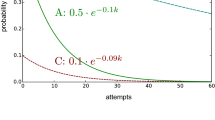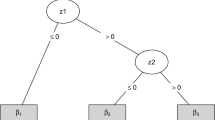Abstract
The additive factor model is a widely used tool for analyzing educational data, yet it is often used as an off-the-shelf solution without considering implementation details. A common practice is to compare multiple additive factor models, choose the one with the best predictive accuracy, and interpret the parameters of the model as evidence of student learning. In this work, we use simulated data to show that in certain situations, this approach can lead to misleading results. Specifically, we show how student skill distribution affects estimates of other model parameters.
Access this chapter
Tax calculation will be finalised at checkout
Purchases are for personal use only
Similar content being viewed by others
References
Akaike, H.: A new look at the statistical model identification. IEEE Trans. Autom. Control 19(6), 716–723 (1974)
Aleven, V., Koedinger, K.R.: Knowledge component (kc) approaches to learner modeling. In: Sottilare, R.A., Graesser, A., Hu, X., Holden, H. (eds.) Design Recommendations for Intelligent Tutoring Systems, vol. 1, pp. 165–182. US Army Research Laboratory (2013)
Bishop, C.M.: Pattern Recognition and Machine Learning. Springer, Heidelberg (2006)
Čechák, J., Pelánek, R.: Item ordering biases in educational data. In: Isotani, S., Millán, E., Ogan, A., Hastings, P., McLaren, B., Luckin, R. (eds.) AIED 2019. LNCS (LNAI), vol. 11625, pp. 48–58. Springer, Cham (2019). https://doi.org/10.1007/978-3-030-23204-7_5
Cen, H.: Generalized learning factors analysis: improving cognitive models with machine learning. Ph.D. thesis, Carnegie Mellon University (2009)
Cen, H., Koedinger, K.R., Junker, B.: Is over practice necessary?-Improving learning efficiency with the cognitive tutor through educational data mining. In: Proceedings of Artificial Intelligence in Education, pp. 511–518 (2007)
Durand, G., Goutte, C., Belacel, N., Bouslimani, Y., Leger, S.: Review, computation and application of the additive factor model (AFM). Technical report 23002483. National Research Council Canada (2017)
Effenberger, T., Pelánek, R., Čechák, J.: Exploration of the robustness and generalizability of the additive factors model. In: Proceedings of Learning Analytics & Knowledge, pp. 472–479 (2020)
Käser, T., Koedinger, K., Gross, M.: Different parameters-same prediction: an analysis of learning curves. In: Proceedings of Educational Data Mining (2014)
Koedinger, K.R., Baker, R.S., Cunningham, K., Skogsholm, A., Leber, B., Stamper, J.: A data repository for the EDM community: the PSLC DataShop. Handbook Educ. Data Mining 43, 43–56 (2010)
Koedinger, K.R., McLaughlin, E.A.: Closing the loop with quantitative cognitive task analysis. In: Proceedings of Educational Data Mining (2016)
Koedinger, K.R., McLaughlin, E.A., Stamper, J.C.: Automated student model improvement. In: Proceedings of Educational Data Mining (2012)
Koedinger, K.R., Stamper, J.C., McLaughlin, E.A., Nixon, T.: Using data-driven discovery of better student models to improve student learning. In: Lane, H.C., Yacef, K., Mostow, J., Pavlik, P. (eds.) AIED 2013. LNCS (LNAI), vol. 7926, pp. 421–430. Springer, Heidelberg (2013). https://doi.org/10.1007/978-3-642-39112-5_43
Liu, R., Koedinger, K.R.: Variations in learning rate: student classification based on systematic residual error patterns across practice opportunities. In: Proceedings of Educational Data Mining (2015)
Liu, R., Koedinger, K.R.: Going beyond better data prediction to create explanatory models of educational data. In: The Handbook of Learning Analytics, pp. 69–76 (2017)
Liu, R., Koedinger, K.R., McLaughlin, E.A.: Interpreting model discovery and testing generalization to a new dataset. In: Proceedings of Educational Data Mining, pp. 107–113 (2014)
Long, Y., Holstein, K., Aleven, V.: What exactly do students learn when they practice equation solving?: Refining knowledge components with the additive factors model. In: Proceedings of Learning Analytics and Knowledge, pp. 399–408. ACM (2018)
Murray, R.C., et al.: Revealing the learning in learning curves. In: Lane, H.C., Yacef, K., Mostow, J., Pavlik, P. (eds.) AIED 2013. LNCS (LNAI), vol. 7926, pp. 473–482. Springer, Heidelberg (2013). https://doi.org/10.1007/978-3-642-39112-5_48
Nguyen, H., Wang, Y., Stamper, J., McLaren, B.M.: Using knowledge component modeling to increase domain understanding in a digital learning game. In: Proceedings of Educational Data Mining (2019)
Nixon, T., Fancsali, S., Ritter, S.: The complex dynamics of aggregate learning curves. In: Proceedings of Educational Data Mining, pp. 338–339 (2013)
Pelánek, R.: Metrics for evaluation of student models. J. Educ. Data Mining 7(2), 1–19 (2015)
Pelánek, R.: Bayesian knowledge tracing, logistic models, and beyond: an overview of learner modeling techniques. User Model. User-Adapted Interact. 27(3), 313–350 (2017). https://doi.org/10.1007/s11257-017-9193-2
Pelánek, R.: The details matter: methodological nuances in the evaluation of student models. User Model. User-Adapted Interact. 27, 1–29 (2018). https://doi.org/10.1007/s11257-018-9204-y
Rivers, K., Harpstead, E., Koedinger, K.: Learning curve analysis for programming: Which concepts do students struggle with? In: Proceedings of International Computing Education Research, pp. 143–151 (2016)
Schwarz, G.: Estimating the dimension of a model. Ann. Statist. 6(2), 461–464 (1978)
Author information
Authors and Affiliations
Corresponding authors
Editor information
Editors and Affiliations
Rights and permissions
Copyright information
© 2021 Springer Nature Switzerland AG
About this paper
Cite this paper
Čechák, J., Pelánek, R. (2021). Better Model, Worse Predictions: The Dangers in Student Model Comparisons. In: Roll, I., McNamara, D., Sosnovsky, S., Luckin, R., Dimitrova, V. (eds) Artificial Intelligence in Education. AIED 2021. Lecture Notes in Computer Science(), vol 12748. Springer, Cham. https://doi.org/10.1007/978-3-030-78292-4_40
Download citation
DOI: https://doi.org/10.1007/978-3-030-78292-4_40
Published:
Publisher Name: Springer, Cham
Print ISBN: 978-3-030-78291-7
Online ISBN: 978-3-030-78292-4
eBook Packages: Computer ScienceComputer Science (R0)





